Pets at School?
Pets at School?
Animal Science course at CA-BOCES offers hands-on education.
Students, do you often find yourself easily bored while attending classes? Parents, have you ever noticed your child becoming disengaged or uninterested with their schoolwork? For both of you, would you consider yourself to be an animal lover?
These are rhetorical questions of course, but keep the answers to them in your mind as you read further…
Dear reader, if you have a pet(s) at home, then you know how much happiness and joy one can bring into your life. If school feels a bit mundane, why wouldn’t you keep a pet at school? Better yet, why not make an animal the very basis of your education? Kristina Ellis of CA-BOCES’ Animal Science program has done just that. When you take the steps forward into high school and begin to consider programming at BOCES, Ellis and her Animal Science course should be top priority on your list. For as long as this class is active within the program, it will continue to produce outstanding young prospects within the professions of Veterinarian, Veterinarian’s Assistant, Groomer, Trainer, Caretaker, Pet-Sitter, and much more. Many career paths and choices stem from this class; it is a very good opportunity if you are interested in a broad field of study later on in higher education.
While enrolled in Ellis’ class, students will gain all kinds of new experiences with animals. And there is no shortage of animals in the Animal Science classroom; a comprehensive list of the animals that a student will work with include dogs, mice, spiny mice, rats, hamsters, guinea pigs, chinchillas, rabbits, degu, hedgehogs, ferrets, fish, doves, sun conures, a ball python, corn snake, geckos, and a leopard tortoise. When speaking with Ellis, she stressed that Animal Science is a VERY involved course. “Students will work directly hands-on with the animals and it is required in order to pass the class, they will have to handle and restrain the animals when needed for medical care or physical exams - even the snakes.”
While students work with animals in session, they can even continue working with them out of session. During school breaks and summer vacations, it is optional to take an animal home (with parent/guardian permission, of course). When there are animals left behind, Ellis comes in and tends to them with a crew of workers - and she will give out extra credit for any student who chooses to enter and care for the animals over the aforementioned break.
Skill comes with experience, experience develops skills, and the skills that a student can learn while attending CA-BOCES’ Animal Science program are plentiful. Many of these skills are not limited to just the classroom, but are great tools to have in any situation. On any given day, a student develops skills such as office business and time management, cooperation, reliability, dependability, husbandry, restraining, first-aid, safety, surgical skills, and grooming through lesson plans that include in-depth looks at proper nutrition, knowing animal rights and welfare, animal psychology and behavior, genetics and reproduction, parasitology, clinical procedures, anatomy, and physiology. Hopefully that comprehensive list really puts into perspective just how broad this course really is! A student doesn’t go the journey alone though; Ellis is with them every step of the way. When asked what aspect of her job she particularly enjoys the most, Ellis proudly proclaims, “I love my job! I personally enjoy watching the kiddos grow in their skills and confidence with handling.”
It seems like the animals and kids are all in very good hands.
Students interested in enrolling into any BOCES programming should contact their home school’s guidance counselor. If you like animals, give the Animal Science course a shot. It is a two-year curriculum, junior year to senior year. Satisfaction guaranteed, you’ll have a blast!

